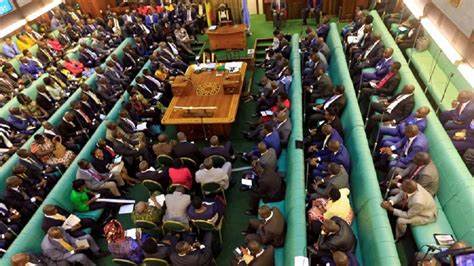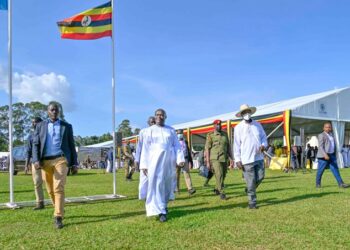By AGGREY BULUBA
Kampala – On Wednesday, November 6, Uganda’s Parliament witnessed an unprecedented scene as security forces stormed the chambers, halting proceedings with shocking force.
It was around 11 a.m. when Parliament suddenly went dark. The abrupt dimming of lights signaled trouble. Just moments before, the Speaker of Parliament had suspended twelve MPs, but what followed was far from routine. As soon as the Speaker’s gavel struck, tension filled the room. Armed officers began swarming the building, while soldiers in civilian clothes gathered outside the President’s office, poised for what was to come.
Within minutes, plainclothes security operatives entered through a small side door and advanced toward the chamber. Security forces barged in as MPs continued the session, singling out opposition members. Some MPs attempted to resist, only to be forcibly dragged away, many falling under chairs as they struggled to break free. The MPs’ pleas were overpowered by the commotion—the rapid shuffling of feet and the shouts of soldiers. The operation was swift but marked by unrestrained brutality.
The actions of the security forces were nothing new—more like a repeated habit that’s become all too familiar in Uganda. This wasn’t the first time they had stormed Parliament in this way. Just like during the infamous “Togikwatako” saga, when opposition MPs were brutalized, many left with lasting injuries, including Hon. Nambooze from Mukono Municipality, this latest invasion once again demonstrated the government’s apparent disregard for the rights of elected representatives. Whenever the government feels threatened by proposed bills or opposition actions, the response seems to be the same: intimidate and silence dissent. As the saying goes, “When the elephant walks, the grass must bow,” but in this case, the “grass” was the MPs—trampled by those meant to safeguard them.
Amidst the chaos, the Vice-President entered the building, immediately noticing the presence of unfamiliar soldiers in the corridors. She asked, “Why do I see so many suspicious people walking through the halls?” but received no answer. Inside the chamber, opposition MPs were still being forcefully removed, fighting to maintain both their dignity and their right to speak. For forty minutes, the operation unfolded without any official explanation, as MPs were ushered out of the chamber through back exits.
Outside, MPs expressed their frustration and fear, vowing they wouldn’t resume the session without media presence to ensure accountability. They had no answers as to who had sent the security forces or ordered the attacks; all they knew was that they had been targeted for performing their roles as representatives of the people.
This latest security invasion has sent shockwaves through Uganda, leaving citizens and leaders alike questioning whether Parliament retains any genuine authority. The Speaker’s silence on the matter only deepens the uncertainty, while the source of the command remains unknown, leaving a disturbing sense that the very institutions designed to protect democracy are under siege.
This troubling trend seems to be transforming Parliament from a place of open debate and democratic exchange into a battleground where power, rather than dialogue, dictates who can speak without fear. As the saying goes, “You can fool the people for some time, but you can’t fool them forever.” Ugandans are watching closely, their voices increasingly united in asking: “When will this end?”







Discussion about this post